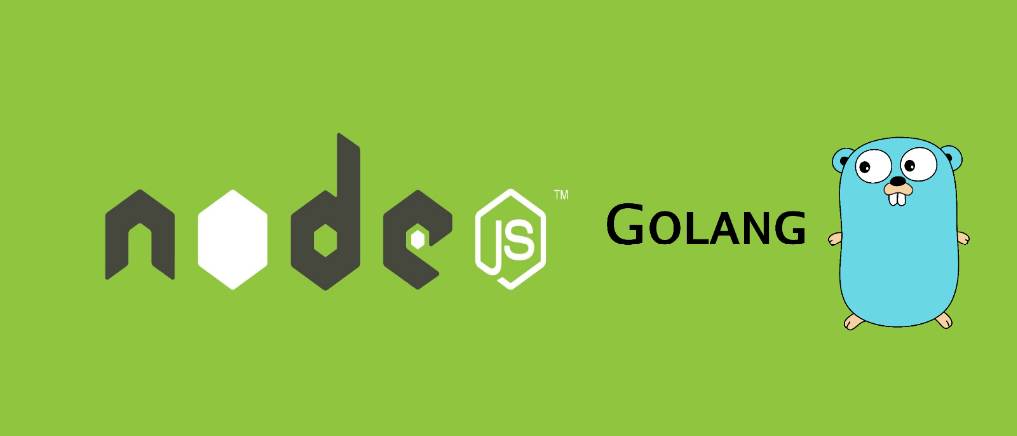If, by chance, you are building up a web application, you may have known about Node.JS and Golang (otherwise called "Go"). Both are picking up ubiquity, yet in altogether different courses, and for altogether different reasons. These languages stand for a development far from customary server - side dialects, for example, PHP and Java. Give us a chance to investigate what they are and how they analyze.
What is Node.JS?
Node.JS is a stage for utilizing JavaScript as the back end of your web application. As such, it enables you to utilize the Internet's most mainstream dialect for a whole web application. This has prompted Node.JS turning into the quickest developing stage on the web, by far.
This has some enormous ramifications. For a business, an essential factor in picking what advancement instruments to utilize is the quantity of talented designers accessible. Each web designer has coded probably SOME JavaScript, and most have done parts. Finding a gifted JavaScript engineer will be simple.
Additionally, Node.js execution is incredible. It is based on Chrome's V8 motor, which accumulates JavaScript to local machine code, making it extremely quick. Additionally, Hub presents things like the non-blocking occasion circle and the Hub bundle administrator. These things make server side programming simple for engineers.
What is Golang (GO)?
As indicated by the Go landing page: "Go is an open source programming dialect that makes it simple to manufacture straightforward, solid, and proficient programming." It is moderately new and created by Google, so you realize it will be good. As opposed to being a transformative dialect, the makers have completed an entire reexamine of programming. They've gone the distance back to the primary standards of C and worked from that point.
This has brought about Go having some extremely one of a kind properties. The most imperative is a straightforward and powerful method for managing simultaneous programming properties and, conceivably colossal execution upgrades over different dialects and stages.
While Go is still not even close as prominent as Node.JS, it is making progress rapidly. Aside from the makers, Google, some other tremendous undertakings have changed to utilizing Go. Both Dropbox and Docker have now picked Go to build up their monstrous, simultaneous applications.
Execution elements
There are numerous elements that impact the execution of a programming dialect. A portion of the ones we will take a gander at here are:
- Crude execution
- Genuine execution
- Simultaneousness/Parallel programming apparatuses
- Adaptability
- Apparatuses for engineers
- Expectation to absorb information
- Best practices and traditions
- Quality of the designer network
- Simplicity of discovering good designers
Node.JS execution can be either extraordinary or horrible, contingent upon who you ask, and what application you are dealing with. It keeps running on JavaScript, which is a deciphered dialect. This implies crude execution and calculation can never be as quick as an arranged dialect like Go. Look at this correlation of Node.JS versus Golang on numerous tests. As should be obvious, Go performs requests of extent better on numerous tests.
Then again, Go is worked for crude execution. Google chose to structure the dialect simply out of dissatisfaction with the present programming dialects poor execution. Also, they've plainly succeeded. Taking a gander at the crude execution information here, you can see it outflanks the JavaScript Node.JS without a doubt.
Genuine execution
It is enticing to take a gander at crude execution information and accept Go is the one to go with. In any case, much of the time, it just doesn't make a difference. For instance, associating with your database is regularly the bottleneck for your server execution. At the point when this is the situation, Node.JS and Go perform with comparable velocities.
Simultaneousness and versatility
This is the place Go truly sparkles. The reason the folks at Google, Docker, and Dropbox use Go is that they have expansive applications that require things to be done in parallel. Go has a totally unique approach to simultaneous programming than different dialects. It oversees strings with things called 'go schedules' that handle correspondence in parallel adequately.
Node.JS adaptability is less rich. Customary simultaneous programming in JavaScript is finished with occasion callbacks. This can get muddled rapidly. In any case, there are individuals taking a shot at this issue with things like JS guarantees that will carry out the responsibility much of the time.
JavaScript is a standout amongst the most prominent and entrenched programming dialects on the planet. All things considered, that is the reason Node.JS is so appealing in any case. There are such huge numbers of devices for each conceivable application. Libraries, stages, precedents, instructional exercises… in the event that you require something done, you can discover a bundle, library, or device for it.
Go has some decent libraries and bundles to utilize, however it doesn't seem as though it will make up for lost time with Node.JS at any point in the near future. As a designer, you will complete much more of the programming preparation. The Node.JS people group is wonderful and far greater than Go's. It is sheltered to state that Node.JS isn't going anyplace soon.
Learning Node.JS is simple for web engineers. Regardless of whether you haven't done much JavaScript, there are such a large number of incredible assets to learn for nothing on the web. Also, Node.JS occasion circle makes simultaneous server programming very simple.
Choosing to utilize go will mean you need to take in an altogether new dialect and presumably use JavaScript toward the front. This is justified, despite all the trouble for bigger associations that can manage the cost of the venture, and need the execution gains. Be that as it may, on the off chance that you are not creating something like this, you should need to stay with what is simple.
Best practices and traditions
JavaScript is famous for awful code and poor engineer rehearses. This could be on the grounds that:
- A parcel of JavaScript designers are self-trained
- A "that will do" frame of mind
- Scalability issues with callbacks
This can be an issue for engineers and those that employ designers. It's difficult to get out from under old propensities, and its elusive engineers with good propensities. Go generally empowers good programming practice. Google structured it with the goal that huge groups could take a shot at extensive ventures successfully and effortlessly. As you are modifying, Go appears to manage you into settling on brilliant decisions as a designer.
Discovering engineers
Extraordinary JavaScript engineers – and even Node.JS masters – are anything but difficult to discover (and in this manner less expensive!). You'll have the capacity to discover good offices with gigantic experience to assist you with your undertaking, at a good cost.
Go is much more up to date and has a small division of the engineers. This implies you likely don't have a Go master drifting around your office. What's more, finding a talented engineer will be progressively troublesome and costly. In any case, over the long haul, the time put resources into an exceedingly rich, adaptable instrument for your back-end may very well pay off.
Working with designers
The fame of Node.JS implies most developers won't require much persuading to utilize it. In the Go 2016 Overview, they found that designers were overwhelmingly happy without tough using Go, yet thought that it was hard to persuade others regarding the equivalent. Today the situation for Go hasn’t changed much. Yep, it provides some basic UI features and can be used for single-page apps, but don’t expect any sophisticated UI for your app with Go.
Considering all mentioned above, we suggest to properly address the needs for your app. If you’re looking to create a simple app with basic UI and would like to make it quick, scalable, and reliable, Go can be a choice for you. However, if you need some reach UI elements for your app and are not ready to invest in the relatively new development language, consider switch to Node.JS.









